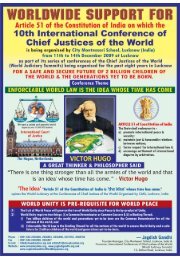Download the Speeches of all Hon'ble Chief Justices & Judges in ...
Download the Speeches of all Hon'ble Chief Justices & Judges in ...
Download the Speeches of all Hon'ble Chief Justices & Judges in ...
You also want an ePaper? Increase the reach of your titles
YUMPU automatically turns print PDFs into web optimized ePapers that Google loves.
Hon’ble Madam Justice Sophia Akuffo,Judge <strong>of</strong> <strong>the</strong> Supreme Court <strong>of</strong> Ghanaat <strong>the</strong> Conferencepaedophile r<strong>in</strong>gs, massive and debilitat<strong>in</strong>g pollution, stockpiles <strong>of</strong> nuclear warheads ando<strong>the</strong>r weapons <strong>of</strong> mass destruction <strong>in</strong> <strong>the</strong> hands <strong>of</strong> numerous states and non-state groupsand <strong>in</strong>dividuals. They read statistics <strong>of</strong> <strong>the</strong> accelerated depletion rate <strong>of</strong> <strong>the</strong> earth’sra<strong>in</strong>forests. They have observed, <strong>the</strong> reduction <strong>in</strong> <strong>the</strong> average annual ra<strong>in</strong>f<strong>all</strong> and foodproduction, and <strong>the</strong>y live <strong>in</strong> an age <strong>of</strong> a rapidly expand<strong>in</strong>g rate <strong>of</strong> desertification… Thetragic and disturb<strong>in</strong>g list goes on and on; I am an adult, yet <strong>the</strong> present state <strong>of</strong> <strong>the</strong> worldscares me too. Admittedly, some <strong>of</strong> <strong>the</strong>se frightful conditions are natural, however, we <strong>all</strong>have to admit that most <strong>of</strong> <strong>the</strong>m are <strong>the</strong> direct result <strong>of</strong> human behaviour and failures and,thus, controllable.The children have, <strong>the</strong>refore, appealed to <strong>the</strong> judiciary <strong>of</strong> <strong>the</strong> world, to support <strong>the</strong>ir c<strong>all</strong>for a new world order – an equitable and enforceable world order – where<strong>in</strong> respect for <strong>in</strong>ternational law will have realmean<strong>in</strong>g. They have c<strong>all</strong>ed on us to advocate for <strong>the</strong> establishment <strong>of</strong> a ‘World Parliament’ that is leg<strong>all</strong>y empowered toenact laws that will be as applicable <strong>in</strong>ternation<strong>all</strong>y to <strong>all</strong> nations and peoples <strong>of</strong> <strong>the</strong> world, and as effective as domestic lawsare applicable <strong>in</strong> sovereign states.The governance structure created by <strong>the</strong> Charter <strong>of</strong> <strong>the</strong> United Nations did not make room for legislation backed byeffective enforcement to achieve <strong>the</strong> objectives reflected by <strong>the</strong> Preamble. This has been one <strong>of</strong> <strong>the</strong> most critical shortcom<strong>in</strong>gs<strong>of</strong> <strong>the</strong> United Nations system. In effect, and for <strong>the</strong> purposes <strong>of</strong> assurance <strong>of</strong> peace, security and survival, <strong>the</strong>refore,<strong>in</strong>ternational law under <strong>the</strong> Charter (and <strong>the</strong> bodies <strong>of</strong> <strong>in</strong>ternational law that have spun <strong>of</strong>f from <strong>the</strong> Charter) did not advancevery far from classical <strong>in</strong>ternational law. It is still based on sovereign will. And with <strong>the</strong> composition <strong>of</strong> <strong>the</strong> Security Counciland <strong>the</strong> veto power <strong>of</strong> its five permanent members, who amongst <strong>the</strong>mselves control <strong>the</strong> bulk <strong>of</strong> <strong>the</strong> world’s nuclear andweapons <strong>of</strong> mass destruction capacity, it is arguable that <strong>the</strong>re is no difference from pre-World War II power diplomacy.In many ways, International Law, as we know it, is and has always been more <strong>of</strong> a doctr<strong>in</strong>e on <strong>the</strong> basis <strong>of</strong> which sovereignstates agree (subject to such reservations as <strong>the</strong>y may choose to make) to be bound by specified treaties, agreements andconventions. And although <strong>the</strong>re are bodies <strong>of</strong> practices which have over <strong>the</strong> years and decades evolved <strong>in</strong>to what aretermed ‘customary <strong>in</strong>ternational law’, adherence to <strong>the</strong>m and <strong>the</strong>ir observance are pr<strong>in</strong>cip<strong>all</strong>y founded on <strong>the</strong> will <strong>of</strong> sovereignstates and are <strong>the</strong>refore, purely consensual and voluntary, ra<strong>the</strong>r than driven by effective enforcement. Recent world eventshave more than amply demonstrated, where needed, that if a State is powerful or dar<strong>in</strong>g enough, it can plough tracksthrough <strong>in</strong>ternational norms and customs with impunity.As far back as 1967, Pr<strong>of</strong>essor George Schwarzenberger, <strong>in</strong> discuss<strong>in</strong>g <strong>the</strong> requirements <strong>of</strong> a world order, observed that:-‘In order to adapt <strong>in</strong>ternational relations to <strong>the</strong> requirements <strong>of</strong> a chang<strong>in</strong>g world, <strong>in</strong>ternational legislative orquasi-legislative organs with discretionary powers are <strong>in</strong>dispensable…..’The world has changed drastic<strong>all</strong>y s<strong>in</strong>ce 1967. The scope <strong>of</strong> <strong>in</strong>ter-relationships and <strong>in</strong>ter-dependence amongst humank<strong>in</strong>dhas become more immediate and <strong>in</strong>timate than ever before <strong>in</strong> <strong>the</strong> history <strong>of</strong> this planet. Hence, <strong>the</strong> need to establish aneffective <strong>in</strong>ternational legislature to govern <strong>in</strong>ternational relations and assure real <strong>in</strong>ternational order based on univers<strong>all</strong>yapplicable laws is even more press<strong>in</strong>g. In course <strong>of</strong> <strong>the</strong> globalization <strong>of</strong> <strong>the</strong> world, a number <strong>of</strong> critical changes have alsooccurred which are too extensive to be enumerated here. However and most frightfully, <strong>the</strong>se changed realities <strong>in</strong>clude <strong>the</strong>‘privatisation’ <strong>of</strong> <strong>the</strong> means to <strong>in</strong>itiate nuclear holocaust or unleash weapons <strong>of</strong> mass destruction. Apart from weapons thathave not been satisfactorily accounted for s<strong>in</strong>ce <strong>the</strong> collapse <strong>of</strong> <strong>the</strong> Soviet Union, and <strong>the</strong> miss<strong>in</strong>g contents <strong>of</strong> weaponmak<strong>in</strong>g<strong>in</strong>st<strong>all</strong>ations <strong>in</strong> o<strong>the</strong>r parts <strong>of</strong> <strong>the</strong> world, <strong>the</strong> know-how for home-spun weapons <strong>of</strong> mass destruction is available on<strong>the</strong> <strong>in</strong>ternet. Demonstrably, <strong>the</strong> <strong>in</strong>itiation <strong>of</strong> war is no longer <strong>the</strong> exclusive preserve <strong>of</strong> sovereign states; ra<strong>the</strong>r, it is now with<strong>in</strong><strong>the</strong> capability <strong>of</strong> groups <strong>of</strong> <strong>in</strong>dividuals who are outside <strong>the</strong> effective control <strong>of</strong> any organized state system.At first blush, <strong>the</strong> idea <strong>of</strong> an <strong>in</strong>ternational legislature, with <strong>the</strong> power to enact <strong>in</strong>ternation<strong>all</strong>y enforceable laws, seems to flyaga<strong>in</strong>st <strong>the</strong> fundamentals on which <strong>the</strong> current <strong>in</strong>ternational law regime is built, particularly sovereignty. However, where is<strong>the</strong> sanctity or reality <strong>of</strong> state sovereignty <strong>in</strong> our present times when a s<strong>in</strong>gle act <strong>of</strong> terrorism <strong>in</strong> one country can have--49--
















